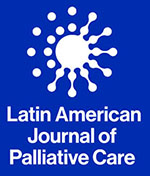The (re)construction of female identity among women cancer survivors
a qualitative study
DOI:
https://doi.org/10.59679/LAPC20230044Keywords:
Femininity, Social Identification, Body Image, Cancer Survivors, CultureAbstract
Introduction: During and even after cancer treatment, changes related to patients’ body image and concerns about their female identity can impact both their physical and emotional health. This study aimed to understand the (re)construction of female identity among women cancer survivors.
Methods: This was a qualitative study developed based on the concept of identity. Twenty-one adult women who had undergone or were undergoing antineoplastic treatment were interviewed.
Results: The data analysis process revealed three themes, namely: Femininity on the skin, Being feminine in the eyes of others, and Being feminine now.
Discussion: The identity of female cancer survivors was redefined after cancer treatment, since it leads to physical changes that affect the way they perceive themselves and present themselves as feminine to society. From this moment on, these women seek to assert themselves in socially and personally valued behaviors and actions that justify their femininity, building a new identity based on the illness experience.
References
Kelly M, Field D. Medical sociology, chronic illness and the body. Sociol Health Illn. 1996;18(2):241-257.
Baize N, Mounier N, Bongain A, Spano JP. Femininity and breast cancer, original approach of announcement in oncology. Bull Cancer. 2008;95(9):849-857.
Trusson D, Pilnick A. The Role of Hair Loss in Cancer Identity: Perceptions of Chemotherapy-Induced Alopecia Among Women Treated for Early-Stage Breast Cancer or Ductal Carcinoma in Situ. Cancer Nurs. 2017;40(2):E9-E16.
Münstedt K, Manthey N, Sachsse S, Vahrson H. Changes in self-concept and body image during alopecia induced cancer chemotherapy. Support Care Cancer. 1997;5(2):139Y143.
Haines RJ, Bottorff JL, Barclay McKeown S, Ptolemy E, Carey J, Sullivan K. Breast cancer messaging for younger women: gender, femininity, and risk. Qual Health Res. 2010;20(6):731-742.
Koçan S, Gürsoy A. Body Image of Women with Breast Cancer After Mastectomy: A Qualitative Research. J Breast Health. 2016;12(4):145-150.
Xiaomei Z, Shimin W. Political Identity: A Perspective from Cultural Identity. Soc. Sci. China. 2014;35(2):155-173.
Singer M. Medical anthropology. In: Callan H, ed. The International Encyclopedia of Anthropology. Hoboken: Wiley; 2018.
Tong A, Sainsbury P, Craig J. Consolidated criteria for reporting qualitative research (COREQ): a 32-item checklist for interviews and focus groups. Int J Qual Health Care. 2007 Dec;19(6):349-57.
Sadler GR, Lee HC, Lim RS, Fullerton J. Recruitment of hard-toreach population subgroups via adaptations of the snowball sampling strategy. Nurs Health Sci. 2010;12(3):369-374.
Braun V, Clarke V. Reflecting on reflexive thematic analysis. Qual. Res. Sport Exerc. 2019;11(4):589-597.
Noble H, Smith J. Issues of validity and reliability in qualitative research. Evid Based Nurs. 2015;18(2):34-35.
Morales-Sánchez L et al. Enhancing Self-Esteem and Body Image of Breast Cancer Women through Interventions: a systematic review. Int. J. Environ. Res. Public Health. 2021;18,1640.
Sebri V, Durosini I, Triberti S, Pravettoni G. The Efficacy of Psychological Intervention on Body Image in Breast Cancer Patients and Survivors: A Systematic-Review and Meta-Analysis. Front Psychol. 2021;12:611954.
Thompson JK, Heinberg LJ, Altabe M et al. Exacting Beauty:
Theory, Assessment, and Treatment of Body Image Disturbance. Washington, DC: APA Books; 1999.
Gómez CM, Rocha MV. Building and standarzing: a historical-cultural study on female bodies. Áskesis. 2018;7(2):38-51.
van Alphen K, Versluis A, Dercksen W, et al. Giving A Face to Chemotherapy-Induced Alopecia: A Feasibility Study on Drawings by Patients. Asia Pac J Oncol Nurs. 2020 Mar 30;7(2):218-224.
Versluis A, Alphen KV, Dercksen W et al. Looking bad: Female patients drawing their representation of chemotherapy-induced alopecia. [published online ahead of print, 2022 Feb 25]. J Health Psychol. 2022;13591053221075503.
Versluis A, van Alphen K, Dercksen W et al. “Dear hair loss” illness perceptions of female patients with chemotherapy-induced alopecia. Support Care Cancer. 2022 May;30(5):3955-3963.
Zhang Y. Family functioning in the context of an adult family member with illness: A concept analysis. J Clin Nurs. 2018;27(15-16):3205-3224.
Zeighami Mohammadi S, Mohammad Khan S, Zohreh Vanaki K. Reconstruction of feminine identity: the strategies of women with breast cancer to cope with body image altered. Int J Womens Health. 2018;10:689-697.
Nikita, Rani R, Kumar R. Body image distress among cancer patients: needs for psychosocial intervention development. Support Care Cancer. 2022;30(7):6035-6043.
Medeiros MB, Silva RMCRA, Pereira ER, et al. Perception of women with breast cancer undergoing chemotherapy: a comprehensive analysis. Rev Bras Enferm. 2019;72(suppl 3):103-110.
Lacerda CS, Balbino CM, Sá SPC et al. Enfrentamento de mulheres com câncer de mama. Research, Society And Development. 2020;9(7):8-11.
Bury M. Chronic illness as biographical disruption. Sociol Health Illn. 1982;4(2):167-182.
Ussher JM, Perz J; Australian Cancer and Fertility Study Team (ACFST). Threat of biographical disruption: the gendered construction and experience of infertility following cancer for women and men. BMC Cancer. 2018;18(1):250.
Downloads
Published
Versions
- 2024-01-10 (2)
- 2023-12-29 (1)
Issue
Section
License
Copyright (c) 2023 Latin American Journal of Palliative Care

This work is licensed under a Creative Commons Attribution 4.0 International License.



